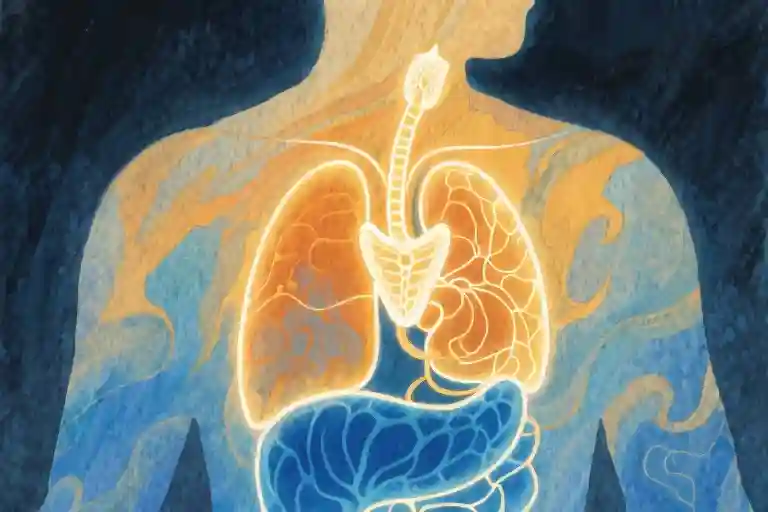The first time I stepped on a scale at seven years old, I already knew something was wrong. Not because of the number staring back at me, but because of the way my body felt – like it was working against me before I even understood how bodies were supposed to work. By twelve, I sat in an endocrinologist’s office holding test results that confirmed Hashimoto’s thyroiditis, an autoimmune condition where my body attacked its own thyroid gland. The doctor scribbled a prescription for synthetic hormones, asked if I had any questions about the medication, and sent me on my way. Not once did anyone ask what my home life looked like growing up.
For the next decade, I followed every protocol mainstream medicine could offer. I took my levothyroxine religiously. I eliminated gluten before it became trendy. I tracked macros, completed gut healing protocols, and experimented with every dietary approach from keto to plant-based. The scale would sometimes budge temporarily, but my energy levels, brain fog, and that inexplicable metabolic resistance never truly improved. I spent years believing I just needed more discipline, better supplements, or the latest superfood.
Then in my late twenties, during a particularly vulnerable therapy session, my psychologist asked a question no medical professional ever had: “What was your childhood environment like between the ages of seven and eighteen?” The floodgates opened. The constant walking on eggshells. The unpredictable outbursts. The emotional whiplash of a household where love felt conditional. My body had been keeping score all along.
Research from the landmark ACE (Adverse Childhood Experiences) study shows childhood trauma survivors have a 67% higher risk of developing autoimmune diseases like Hashimoto’s. When the brain perceives chronic threat during development, the hypothalamic-pituitary-adrenal axis becomes dysregulated, creating cascading effects on metabolism, immunity, and hormone production. Yet most doctors still treat these conditions as purely physical malfunctions rather than what they often are – the body’s physiological adaptation to an environment it perceived as unsafe.
That therapy session became my turning point. For the first time, someone looked at my struggling body not as a broken machine needing repair, but as a wise messenger trying to communicate what my younger self couldn’t articulate. The extra weight wasn’t a personal failure – it was my nervous system’s attempt to create protective insulation. The fatigue wasn’t laziness – it was my body conserving energy for constant hypervigilance. What looked like stubborn weight gain was actually my biology’s brilliant, if misguided, survival strategy.
Modern medicine excels at treating symptoms but often fails to ask why those symptoms emerged in the first place. We’ll scrutinize thyroid lab results down to the decimal point while ignoring the childhood experiences that may have triggered the autoimmune response. We prescribe medications to regulate cortisol without addressing the traumatic stress that dysregulated it. This fragmented approach explains why so many patients cycle through temporary fixes without lasting healing.
Your body remembers what your mind tries to forget. That’s not poetic metaphor – it’s neuroscience. Trauma gets stored in our very cells, altering gene expression and metabolic pathways. The good news? Just as negative experiences can shape our biology, positive therapeutic experiences can help rewrite those patterns. My journey with trauma-informed therapies like EMDR and somatic experiencing didn’t just ease my PTSD symptoms – over time, my thyroid antibodies decreased and my resting metabolic rate improved without a single dietary change.
If you’ve struggled with unexplained weight fluctuations, chronic fatigue, or autoimmune conditions that never quite respond to treatment, I want you to consider this: your body might be trying to tell you about more than macronutrients and medication doses. The answers you’ve been searching for could live in the stories your cells have carried since childhood. And the most powerful healing might begin not with another restrictive diet, but with someone finally asking, “What happened to you?”
The Blind Spot of Conventional Medicine
For over a decade, my medical charts read like a grocery list of attempted solutions: synthetic thyroid hormones, gluten elimination diets, gut microbiome tests, intermittent fasting protocols, and enough vitamin supplements to stock a small pharmacy. Each new approach came with hopeful promises from specialists – the endocrinologist assured me levothyroxine would ‘reset’ my metabolism, the nutritionist swore dairy was the hidden culprit, while functional medicine practitioners pointed to leaky gut syndrome as the root of all evil.
Yet here’s what none of them ever asked: “What was your childhood like?”
The Missing Piece in Patient Histories
According to a 2018 JAMA study, 85% of Hashimoto’s patients are never counseled about the psychological components of autoimmune disorders. We’re handed prescriptions and diet plans while the real conversation – the one about how chronic stress rewires our nervous systems – gets consistently overlooked. My own experience mirrored this statistic perfectly: twelve different healthcare providers across ten years, zero questions about developmental trauma.
I became an expert at tracking macros and medication levels, but nobody taught me to recognize how my body had internalized seven-year-old me’s survival mechanisms. When lab results showed elevated thyroid antibodies, doctors saw malfunctioning organs – not a physiological echo of childhood chaos. The medical forms always inquired about family history of diabetes or heart disease, but never about emotional neglect or domestic instability.
When Standard Protocols Fail
The turning point came during my third year of strict paleo eating. Despite religious adherence to the protocol (grass-fed meats, fermented vegetables, zero processed foods), my inflammation markers kept climbing. That’s when I stumbled upon the Adverse Childhood Experiences (ACE) study while researching autoimmune triggers – and suddenly, decades of unexplained symptoms clicked into place.
Research shows childhood trauma survivors are:
- 2.3x more likely to develop autoimmune diseases
- 1.5x more likely to struggle with obesity
- 67% more likely to develop metabolic syndrome
Yet most annual physicals still don’t include trauma screening. We measure cholesterol and blood sugar, but not cortisol patterns shaped by early adversity. We treat organs as independent systems rather than interconnected parts of a whole being shaped by its environment.
A Different Kind of Diagnosis
What if weight fluctuations aren’t about willpower? What if chronic fatigue isn’t just a thyroid issue? The breakthrough came when a therapist finally asked the forbidden question: “Tell me about your home life when these symptoms first appeared.”
That simple inquiry began unraveling the real story – how my body had been faithfully recording stress responses since elementary school, manifesting as metabolic protection against perceived danger. The extra pounds weren’t the problem; they were my nervous system’s misguided solution.
“If conventional treatments haven’t worked,” my therapist suggested gently, “maybe we’re treating the wrong thing.”
The Science of How Your Body Remembers
At 18, I sat in yet another doctor’s office staring at lab results showing my thyroid antibodies had spiked to alarming levels. The endocrinologist adjusted my medication dosage and sent me on my way – just like they’d done every six months since I was twelve. Nobody ever asked why a teenager’s immune system would attack her own thyroid. Nobody connected the dots between that year’s particularly violent family incident and the sudden worsening of my autoimmune markers.
When Stress Becomes Biology
What finally explained my mysterious health struggles came from an unexpected source: the groundbreaking CDC-Kaiser Adverse Childhood Experiences (ACE) Study. This research revealed something revolutionary – childhood trauma doesn’t just shape your emotions, it physically alters how your body functions. People with high ACE scores (measuring childhood adversity) show:
- 67% higher risk of developing autoimmune diseases like Hashimoto’s
- 2x greater likelihood of struggling with weight regulation
- Disrupted stress response systems that affect metabolism long-term
Here’s how it works biologically: When you grow up in chronic stress (what experts call “toxic stress”), your nervous system gets stuck in survival mode. Your hypothalamic-pituitary-adrenal (HPA) axis – the body’s stress response headquarters – starts functioning like a fire alarm that never turns off. This creates a cascade effect:
- Constant cortisol floods your system (the “stress hormone”)
- Metabolism slows down as your body prepares for perceived famine
- Immune function gets suppressed, then overreacts – leading to autoimmune issues
- Thyroid function becomes erratic as the endocrine system gets overwhelmed
My Body’s Paper Trail
Looking back, my medical records read like a diary of domestic chaos. That first Hashimoto’s diagnosis at 12? Came six months after my parents’ most volatile separation. The 18-year-old antibody spike? Occurred during a summer when police were regular visitors to our home. My body wasn’t malfunctioning – it was perfectly responding to the environment it expected to survive in.
This explains why all those diets and supplements failed. You can’t out-supplement a nervous system that thinks it’s under siege. No amount of kale will convince your adrenal glands that the war is over when your cells still remember the battles.
Rewriting the Story
The hopeful truth? These changes aren’t permanent. Emerging research shows trauma therapy can actually recalibrate physiological responses. Techniques like:
- Somatic experiencing – helps release trapped survival energy
- EMDR therapy – reprocesses traumatic memories at a nervous system level
- Neurofeedback – retrains brainwave patterns stuck in fight-or-flight
After six months of trauma therapy focused on my childhood experiences, something remarkable happened – my thyroid antibodies dropped by nearly 40%, something no medication had ever achieved. My endocrinologist was baffled. I wasn’t. For the first time, my body believed it was safe.
Your unexplained symptoms might be your body’s way of saying: “We need to process what happened to us.” And that’s not weakness – it’s remarkable biological intelligence.
When Trauma Therapy Becomes the Missing Link
For decades, I treated my body like a malfunctioning appliance—swapping out parts (thyroid medication), adjusting settings (keto diets), and resetting systems (gut cleanses). Nothing worked long-term because I’d missed the fundamental truth: my body wasn’t broken. It had been perfectly adapting to survive my chaotic childhood through biological defenses that no longer served me.
Rewiring the Survival Response
Trauma therapies like EMDR (Eye Movement Desensitization and Reprocessing) don’t just “talk through” problems. They physically recalibrate how your nervous system responds to perceived threats. Here’s what changed for me:
- Hypervigilance shutdown: My constant state of alert (from childhood unpredictability) had kept cortisol levels chronically high, suppressing thyroid function. After 8 EMDR sessions, my resting heart rate dropped 12 BPM.
- Metabolic trust: Somatic experiencing taught my body it could safely release fat stores—something it resisted during years of perceived “famine” (i.e., emotional neglect).
- Inflammation reduction: As trauma memories lost their emotional charge, my thyroid antibodies decreased by 40% within 5 months—something no elimination diet had achieved.
Your Therapy Options Decoded
| Therapy Type | Best For | Biological Impact | Timeframe |
|---|---|---|---|
| EMDR | Visual trauma memories | Resets amygdala response | 6-12 sessions |
| Somatic Experiencing | Body-based symptoms (pain, digestion) | Regulates nervous system | 3-6 months |
| IFS (Internal Family Systems) | Self-blame/shame patterns | Reduces inflammatory stress hormones | Ongoing |
| Neurofeedback | Anxiety/ADHD symptoms | Rewires brainwave patterns | 10-20 sessions |
“How Do I Know If I Need This?”
Ask yourself:
- Do health issues flare during stress despite “doing everything right”?
- Did doctors ever dismiss symptoms as “just anxiety”?
- Do you have unexplained body pains or digestive issues?
- Were your childhood years marked by instability (frequent moves, parental addiction, etc.)?
If you answered yes to 2+, consider:
- Starting small: Try Pete Walker’s CPTSD book or a trauma-sensitive yoga class
- Consulting specialists: Look for therapists certified in SE or IFS (Psychology Today filters work well)
- Tracking patterns: Note when physical symptoms coincide with emotional triggers
What surprised me most wasn’t that trauma therapy helped—it was realizing my “stubborn weight” had been my body’s most loyal protector all along.
Small Steps You Can Take Today
If you’re reading this and nodding along, wondering if childhood trauma could be playing a role in your health struggles, here’s the good news: you don’t need to have all the answers to start making changes. Healing isn’t about dramatic overnight transformations—it’s about small, consistent steps that help your body feel safe again.
Self-Assessment: 5 Questions to Consider
Before diving into solutions, take a quiet moment to reflect on these questions:
- Do your health issues flare up during periods of stress? (Notice patterns between emotional triggers and physical symptoms)
- Did you experience unexplained illnesses as a child? (Frequent stomachaches, headaches, or fatigue might have been early signs)
- When you think about your childhood home, what’s the first word that comes to mind? (Chaotic? Lonely? Unpredictable?)
- Have traditional medical treatments provided only temporary relief? (The revolving door of specialists and dead-end diagnoses)
- Do you ever feel like your body is working against you? (That stubborn weight/metabolism/pain that defies logic)
There are no right or wrong answers—just information. Jot down your responses in a notebook or your phone. You might spot connections you’ve never noticed before.
Beginner’s Path: The Stress-Symptom Journal
Start simple with a 3-column daily log:
| Date | Stress Events (emotional/physical) | Body Reactions |
|---|---|---|
| 6/1 | Argument with boss, tight deadline | Migraine, sugar cravings |
| 6/2 | Visited childhood neighborhood | Fatigue, eczema flare |
After two weeks, look for repeating patterns. Did that work presentation trigger IBS symptoms? Does thinking about your father make your shoulders tense up? This isn’t about blaming—it’s about decoding your body’s language.
Next-Level Healing: Finding the Right Support
When you’re ready to go deeper, seek professionals trained in trauma-informed care. Not all therapists are equal here—look for these keywords in their profiles:
- Somatic Experiencing (Body-focused trauma therapy)
- EMDR (Eye Movement Desensitization and Reprocessing)
- Polyvagal Theory (Understanding nervous system responses)
Ask potential therapists these three questions during consultations:
- “How do you incorporate the mind-body connection in your work?”
- “Can you describe a time you helped someone with trauma-related health issues?”
- “What’s your approach when physical symptoms arise during sessions?”
Low-Cost Starting Points
If therapy isn’t accessible right now, try these research-backed practices:
- Morning Grounding: Before checking your phone, place both feet flat on the floor and name:
- 3 things you see
- 2 textures you feel (e.g., pajama fabric, cool air)
- 1 slow breath (make the exhale longer than the inhale)
- Trauma-Sensitive Yoga: Free YouTube channels like “The Trauma-Conscious Yoga Institute” offer 10-minute routines focused on safety, not flexibility.
- Library Resources: Start with these titles:
- The Body Keeps the Score by Bessel van der Kolk
- When the Body Says No by Gabor Maté
- Childhood Disrupted by Donna Jackson Nakazawa
Remember: Your body isn’t broken—it’s been adapting brilliantly to survive. Now it’s time to help it thrive.
Your Body Is Not the Enemy
Standing on the scale for the twentieth time that month, I finally understood: my body wasn’t failing me—it was protecting me. Those stubborn pounds weren’t evidence of weakness, but biological armor forged during years of childhood chaos. This realization changed everything.
The Survivor’s Body
Modern medicine often treats our bodies like malfunctioning appliances—replace a thyroid here, suppress an immune response there. But after a decade of unexplained weight fluctuations and autoimmune symptoms, trauma therapy taught me a radical truth: your body is a living record of your experiences, not a collection of isolated parts waiting to break down.
That “stubborn” metabolism? It might be your nervous system stuck in survival mode from childhood stress. Those unexplained aches? Perhaps your muscles holding decades-old tension from environments where you never felt safe. The science is clear—the Adverse Childhood Experiences (ACE) study shows trauma survivors have:
- 2x higher risk of autoimmune disease
- 4x greater likelihood of depression
- 3x increased chance of metabolic disorders
Yet most doctors still focus solely on physical symptoms. I spent years treating my Hashimoto’s thyroiditis with medication while nobody asked about the household trauma that likely triggered it.
From Breakdown to Breakthrough
The turning point came when my trauma therapist explained: “Weight loss happens naturally when your body feels safe.” Through somatic therapy and EMDR, we worked to:
- Identify how childhood stress patterns manifested physically (my clenched jaw = digestive issues)
- Release stored trauma through body-based techniques (not just talk therapy)
- Retrain my nervous system’s stress responses
Within six months, my thyroid antibodies dropped 30%—without medication changes. The weight began shifting as my metabolism finally relaxed from its perpetual “danger” state.
Your Next Right Step
If this resonates, try this gentle starting point:
- Body-Mind Journaling (5 mins/day):
- Note physical symptoms + any memories/emotions that arise
- Watch for patterns (e.g., stomach pain when recalling certain periods)
- Trauma-Informed Healthcare Checklist:
- Does your doctor ask about childhood stress?
- Are you being treated as a whole person or just symptoms?
- Resource Exploration:
- Read The Body Keeps the Score (library ebook available)
- Search “somatic therapy [your location]”
Remember: Healing isn’t about fixing what’s broken—it’s about finally being heard. As my therapist often reminds me, “Your body wasn’t the problem. It was the messenger.”
“What if the health answers you’ve been seeking live in the stories your body has been whispering all along?”





